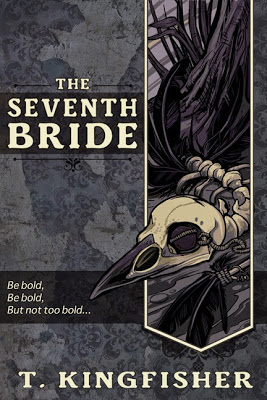 Fans of Patricia McKillip, Juliet Marillier, Brenna Yovanoff, of Holly Black’s plot twists, and of a good hedgehog tale will really enjoy the newest from T. Kingfisher, just in time to read whilst you’re waiting for your root veg to roast before being mashed. Originally to be a “children’s” novel and published as adult, this short novel gallops into YA and on past into CREEPY (think Robin McKinley’s DEERSKIN) adultish fiction. For those of you looking for specifics, yes, I still would hand it to an older teen and say, “Enjoy” if that teen were worldly-wise and in need of a novel where, like in a Tiffany Aching novel, a little bit of cold iron (in skillet form) and pragmatism kicks evil’s simpering butt. There is dark, dark, awful darkness and twistiness, but I think most older young adults would be fine.
Fans of Patricia McKillip, Juliet Marillier, Brenna Yovanoff, of Holly Black’s plot twists, and of a good hedgehog tale will really enjoy the newest from T. Kingfisher, just in time to read whilst you’re waiting for your root veg to roast before being mashed. Originally to be a “children’s” novel and published as adult, this short novel gallops into YA and on past into CREEPY (think Robin McKinley’s DEERSKIN) adultish fiction. For those of you looking for specifics, yes, I still would hand it to an older teen and say, “Enjoy” if that teen were worldly-wise and in need of a novel where, like in a Tiffany Aching novel, a little bit of cold iron (in skillet form) and pragmatism kicks evil’s simpering butt. There is dark, dark, awful darkness and twistiness, but I think most older young adults would be fine.
T. Kingfisher’s literary underpinnings shine through in a novel which explores the power differential between classes and genders, finding our voices, and holding our ground against the collective weight of society. Through the medium of a heroine’s journey, by which she walks the history of the brides before her, our main character moves from childhood to an adulthood we can only envy. Also, did I mention there are hedgehogs? And slugs. These create a winning combination.
Though many prefer the simplicity of the Beauty and the Beast tale for its romantic overtones and ostensible Happily Ever After premise, I have a disturbing predilection for Bluebeard tales. THE SEVENTH BRIDE is loosely based on the 1590 Bluebeard version mentioned in The Faerie Queen, by Edmund Spenser , the one called “Mr. Fox”. This is an English version, and it is from where the ominously echoed words, “Be Bold, be bold, but not too bold,” come. In this version of the Bluebeard tale, we’re never given an indication of who says these warnings; in Kingfisher’s tale, we have an idea – a disturbing one, but it could be true. And, as in every Bluebeard tale, Mr. Fox is FULL of the disturbing – and as always, ignorance is the blanket the community weaves around themselves. Words like “all will be well” are an insubstantial and meaningless comfort. It won’t be well, anyone with an ounce of brain can see that. When all is said and done, everyone knows there are indeed things worse than death… there’s marriage to the baron’s son.
Summary: Rhea is just the miller’s daughter – she knows flour. She knows mills. She can, in a pinch, wash the dishes and tidy the house. She is NOT in the know about Lords, Ladies, Court, the King, Earl, Barons, or how to behave in Society. Unfortunately, due to a random Baron’s son who just happened to wander past the mill… she’s about to find out. Rhea’s …engaged. Not through any choice of hers – and it’s definitely weird that a baron she’s never met or clapped eyes on suddenly wants her. Also, a man that wealthy asking her father for her hand… means that the family’s really not got any choices but to give that hand… and that life… and that girl…away. Rhea is in trouble.
 What begins as merely disturbing quickly veers toward terrifying. The baron’s house lies on a road nobody’s ever seen, the house itself – with bony ravens over the gate and a sound-muffling white dust road – is beyond creeptastic. Inside, the floor drops away, periodically, the help is …disturbingly silent, and no one living at the grand old mansion can tell her anything, really, about the groom to be. When the Baron’s son returns, he keeps giving Rhea these little tasks to do, tasks that are graded on a fail/pass kind of thing, and failure means Married Right Now. Rhea’s going to do her darnedest to pass, and keep passing — and pass on the whole marriage thing, too, while she’s at it.
What begins as merely disturbing quickly veers toward terrifying. The baron’s house lies on a road nobody’s ever seen, the house itself – with bony ravens over the gate and a sound-muffling white dust road – is beyond creeptastic. Inside, the floor drops away, periodically, the help is …disturbingly silent, and no one living at the grand old mansion can tell her anything, really, about the groom to be. When the Baron’s son returns, he keeps giving Rhea these little tasks to do, tasks that are graded on a fail/pass kind of thing, and failure means Married Right Now. Rhea’s going to do her darnedest to pass, and keep passing — and pass on the whole marriage thing, too, while she’s at it.
Because, real marriage is giving your OWN hand – and respect means letting someone exercise their freedom of choice, under their own power. And, no matter that there are no good choices before her – Rhea’s got a hedgehog, which means Rhea will just create some.
Peaks: Kingfisher’s narrative style is very like Terry Pratchett’s, when he’s narrating Tiffany Aching or Susan Sto Helit – this sort of narrative which just shows you the world along the way and keeps murmuring in disquieting tones, “Hmmmm… Okay, now that’s weird…” but never sounds too loud of an alarm, until — well, there’s no reason to sound an alarm, because WAH, OKAY, THIS IS BAD, WHAT THE HECK WILL WE DO. I love books like that, where the narrative voice is present, in an unobtrusive manner, and then kind of whisper shouts, This is dire. And then leaves the protagonist to Getting On With Things. (Usually with a cast iron skillet, in a Pratchett novel; here, it’s with a hedgehog, because they are seriously Getting On With It kinds of animals. Or, so I’ve heard.)
The cover is illustrated by the author – and shows a classically elegant simplicity. The pacing is wonderful and you’ll just want to sit down and swallow this whole. The fact that the Kingfisher person, in her other writing life, is producing a young adult fairytale collection just makes me really pleased.
 Valleys: I found nothing which detracted from the story – nothing. While I could point out that the novel sits in the mold of the Eurocentric fairytale, what with barons and kings and all, it… doesn’t. a.) It’s based on an English tale, so There Will Be Englishmen, and b.) Far from having the blindingly blonde princess type, there’s only sensible, pragmatic Rhea, and c.) this isn’t a tale wherein personal appearance makes any difference to anyone. I can’t say what Rhea looks like, except that she’s not a ginormous prehistoric bird-goddess. We do know, however, that the baron looks like Evil’s Eldest Son, and that’s really good enough to know we should NOT cheer for him marrying anybody, HEA promised or no.
Valleys: I found nothing which detracted from the story – nothing. While I could point out that the novel sits in the mold of the Eurocentric fairytale, what with barons and kings and all, it… doesn’t. a.) It’s based on an English tale, so There Will Be Englishmen, and b.) Far from having the blindingly blonde princess type, there’s only sensible, pragmatic Rhea, and c.) this isn’t a tale wherein personal appearance makes any difference to anyone. I can’t say what Rhea looks like, except that she’s not a ginormous prehistoric bird-goddess. We do know, however, that the baron looks like Evil’s Eldest Son, and that’s really good enough to know we should NOT cheer for him marrying anybody, HEA promised or no.
Conclusion: In the style of that one Ursula Vernon chick who managed to win a Hugo and a Mythopoeic Award, and an whole host of others, T. Kingfisher’s hardworking, prosaic and straightforward heroine saves herself – her trustworthy friends – a few future slugs, and the day. This is a hot-chocolate-mucky-afternoon type of novel which will leave you dreaming of fantastic worlds where clocks are portals to another world, all the woodlands connect, and hedgehogs are true and loyal companions. Here’s to more fairytales from T. Kingfisher.
I received my copy of this book courtesy of buying it myself. Unfortunately, this is only an ebook just now, but you can find THE SEVENTH BRIDE by T. Kingfisher on B&N, Amazon, iBooks, Smashwords, Kobo, or on the author’s site.